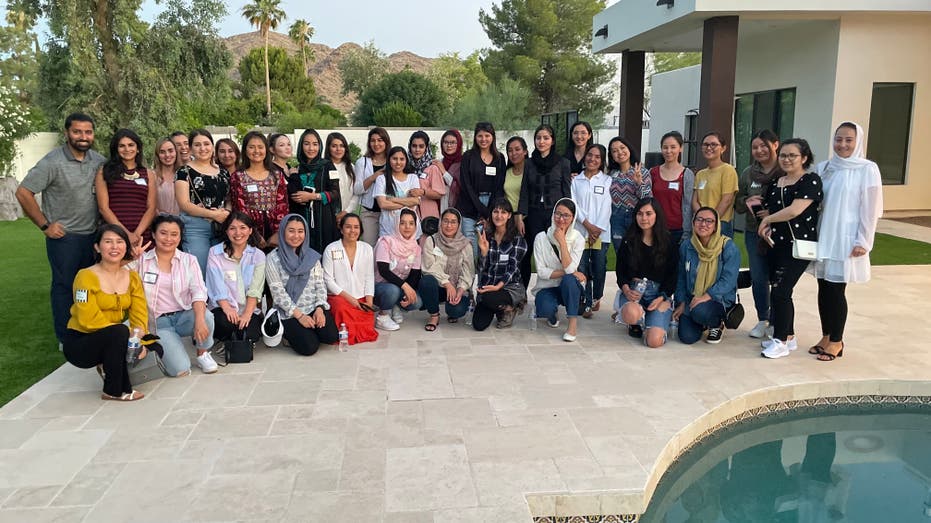
A group of Hazara minority women who were evacuated from Afghanistan with the help of some concerned Americans have continued to thrive in their new home two years after the fall of Kabul.
"These girls are looking ahead to their future," Vicki Mayo, the founder of the Mayo Family Foundation, told Fox News Digital. "They're doing really well, they've adjusted…. the girls are happy, healthy and looking forward to a bright and optimistic future."
Mayo's comments come two years after she helped lead an effort to evacuate 147 women out of Afghanistan. The women, Mayo said, are part of Afghanistan's Hazara minority, a group that has traditionally seen years of persecution in Afghanistan. With the Taliban sweeping to control the country again during the 2021 U.S. withdrawal, over 100 of them attempted to flee Afghanistan.
Watching the chaotic final days of the longest war in U.S. history play out, Mayo told Fox News Digital that she and her husband received a call about the group of women attempting to flee the country. Wanting to do something to help, she leveraged her network of contacts in order to put together a team of ex-military and special forces veterans who were consultants in the region to execute an extraction.
HEROES OF KABUL: ‘ALL GOOD HERE,’ STAFF SGT. RYAN KNAUSS WROTE IN LAST MESSAGE TO MOM
"I think that's what makes the United States so great, is private citizens feeling empowered to make a difference," Mayo said.
According to the United States Holocaust Memorial Museum, the Hazara minority compromises about 20% of the population of Afghanistan. The group has faced years of persecution as an ethnic and religious minority, particularly during periods of Taliban rule. The group has again faced an increase in attacks since the Taliban regained power, leading the group to call for an "an immediate response by the U.S. government and international community."
Mayo talked about the dangers the women faced, noting that the Taliban was likely to kill or traffic the young women.
However, getting the women out was not as easy undertaking, requiring multiple attempts to finally extract them from the country.
LAWMAKERS, SERVICE MEMBERS CELEBRATE AUTHORIZATION OF GLOBAL WAR ON TERRORISM MEMORIAL
"These girls, there were about 173 of them, were spread out throughout Kabul," Mayo said.
Mayo detailed the three phases of the planned rescue, which included getting the women from around town to the airport, securing a plane, then evacuating them and visas to legally stay in the United States.
During the first attempt to organize an evacuation, the plan had to be abandoned after it proved difficult to get all the girls together without putting them in danger. On the second attempt, they were able to put a plan in place to quickly get the women aboard a bus at designated pick up points around the city and get to as close as 250 feet from the entrance to the airport. However, just as the group was about to reach the gate, a bomb was detonated near the Abbey gate that killed over a dozen of the women. That same blast claimed the lives of 13 U.S. service members.
During the third attempt, the group was forced to navigate multiple Taliban checkpoints but were ultimately successful in reaching the airport, successfully evacuating 148 women from the country.
The women were initially flown to Fort McCoy, Wisconsin, where they were among over 13,000 Afghan refugees who were processed there for resettlement. From there, Mayo said, they fanned out across the country, with some receiving scholarships to Ivy League and other state schools.
Over 60 over the women resettled in Arizona, and their cases are under the management of the Mayo Family Foundation. Not only have they received scholarships to attend university, but they have been set with meetings with various business leaders in an attempt to show them the possibilities they can achieve with their new life in the United States.
"We were able to create a real sense of community for the women," Mayo said. "Different business leaders in different ways… we were able to get the girl into a university on scholarship… most of them just finished internships and are working through what their majors are going to be."
As a first generation immigrant herself, Mayo said she was glad to play a role in helping the women achieve a new dream in the U.S., something that seemed impossible just two years ago.
CLICK HERE TO GET THE FOX NEWS APP
"Truly just to hear the words that these Afghan women are located is Arizona is a miracle in and of itself," Mayo said.
Source Link
